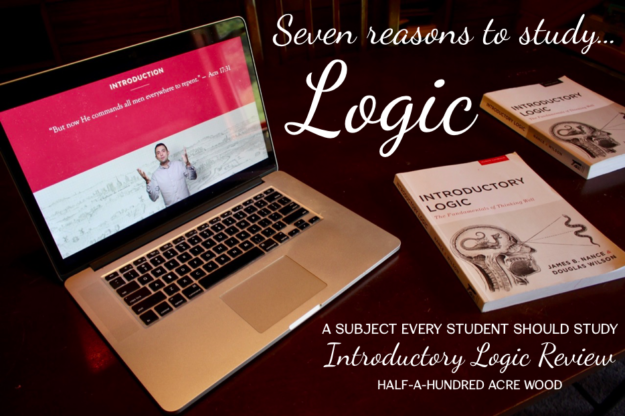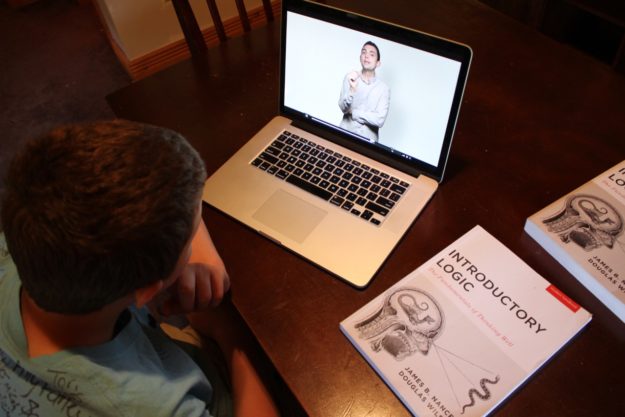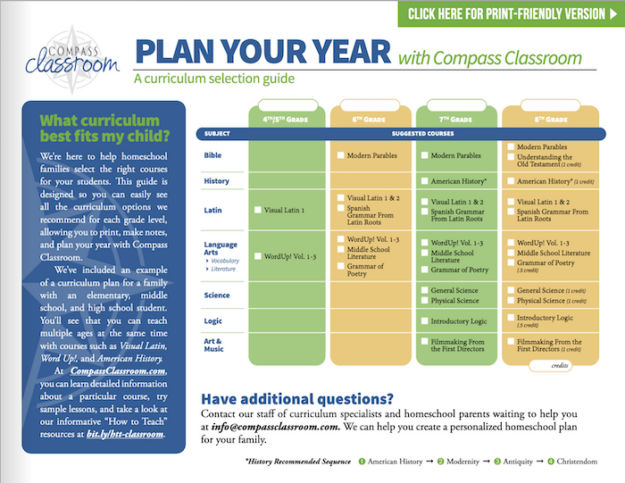“Too many people are taken advantage of because of their lack of critical thinking, logic and deductive reasoning. These same people are raising children without these same skills, creating a whole new generation of clueless people. – Curtis Silver, from “The Importance of Logic and Critical Thinking”
In today’s society, we often become so caught up in what is considered practical and useful (according to a high school credits checklist) that we miss the most important practical and useful elements of our educational endeavors. I say this primarily because, up until about 4 or 5 years ago, I didn’t even consider the study of formal logic as a core subject. I didn’t know what it was, and in my “clueless” state, I really wasn’t all that concerned about it. The result? I easily fell into “hollow and deceptive philosophy” and found myself “tossed to and fro, and carried about with every wind of doctrine.” I couldn’t spot fallacies and failed to recognize when I was taken advantage of. Since that time, our oldest son has completed a course in logic. It’s through his endeavors that I discovered the importance of this subject that has faded away from mainstream education.
Why study logic when it doesn’t count towards a core high school credit? Here’s what we’ve discovered through our study of logic as a family.
Seven Reasons to Study Logic
- Logic builds a habit of thinking in a clear and orderly way. Even though it’s not considered “practical” by modern education standards, logic is the most practical subject to study for a middle school (or high school) student. Not only can teenagers hone their natural propensity for argument at this stage, but they can also apply the process of thinking logically to every field of study, from math and science to writing and humanities. Logic orders and clarifies thinking, no matter what you’re thinking about. It’s a foundational discipline to build upon as you head into upper level courses.
- Studying logic helps with spotting fallacies and recognizing contradictions. From social media to Presidential campaigns, logical fallacies (i.e., common mistakes in reasoning) are prevalent in our society. A person who has studied logic can detect logical mistakes and contradictions he hears or reads and can discern the validity of arguments, which will aid in making wiser decisions.
- Sound logic is an effective tool of persuasion. The power of logical proof leads to the power of persuasion.
- The study of logic improves reading. Logic helps with clarity in reading and is an effective first step in learning literary analysis. Students are able to better analyze literature when they possess the ability to think logically about what they are reading.
- Logic improves communication (in writing and speech). After studying logic, students recognize the validity of their own statements as they write or speak. Logic indeed helps students to write more clearly and effectively.
- Logic helps us to find truth. It specifically helps in the pursuit of truth by: 1) requiring that we define our terms to understand what we mean and 2) requiring that we provide good arguments, reasons, and proofs.
- Logic aids faith. Our children will eventually confront the world. Without the ability of reasoning correctly, his thinking will not be firmly anchored in truth. Students who logically understand their beliefs can also defend it instead of being “tossed to and fro, and carried about with every wind of doctrine.”
In short, God has created man with the ability to reason. With this ability, we can read, communicate, preach, and hear the gospel. Through reasoning, our minds can discern truth. And when our mind closes upon the truth, we can better share that truth with the world around us.
Introductory Logic
It’s all well and good to recognize the importance of studying logic, but how can we go about it? Teaching formal logic can be intimidating, especially when you’ve never studied it yourself. The best way to do this is to find a good, solid program that you can study alongside your student(s). (We recommend studying logic in middle school through adulthood.)
The Introductory Logic program is designed for students and parents who have never tackled traditional logic. The newly updated DVD course (released in 2019) provides a more engaging video format with presentations by Brian Kohl, who has years of teaching the fundamentals of thinking well.
The Introductory Logic Complete Package contains the:
- Student Edition
- Teacher Edition
- Test & Quiz Packet
- DVD Set
In the Student Book (and DVD course), students learn to define terms, form and interpret statements, compose valid syllogisms, analyze arguments, and detect informal fallacies, all of which lead to better precision in speech and debate. The Teacher’s Guide, which also includes all the text from the Student Edition, provides a recommended lesson schedule with detailed lesson plans for completing the course in either a semester or a year, along with answers to all exercises, reviews, quizzes, and tests. The books are designed in a clear, easy-to-follow format with key points and definitions in the margins. The DVD course is laid out in a way that provides clarity and understanding for teachers who are new to logic. (NOTE: Although the DVDs were updated in 2019, the books have remained the same.)
High School Credit?
The study of traditional logic should be considered foundational to every educational curriculum. But there’s also another reason you may want to add logic to your high school plans. Introductory Logic provides 1/2 high school elective credit! (Intermediate Logic may be used for an additional 1/2 high school elective credit for a full year elective credit in high school.) You can find out more about our curriculum selections here and/or how to develop a high school course of study by visiting Homeschooling High School: Scope and Sequence.
Check it out!
Note: Get this resource at 25% off using our special discount code HHAW25. Click here to browse and download sample lessons from all the great courses at Compass Classroom!
To see Introductory Logic for yourself, just visit this product page and click on “sample lessons” on the sidebar to read a sample lesson from both the student book and teacher manual and to watch the video of the introduction lesson. While you’re there, be sure to check out all of Compass Classroom’s free resources here.
You can also visit this helpful website which lays out how to plan your year using Compass Classroom.





